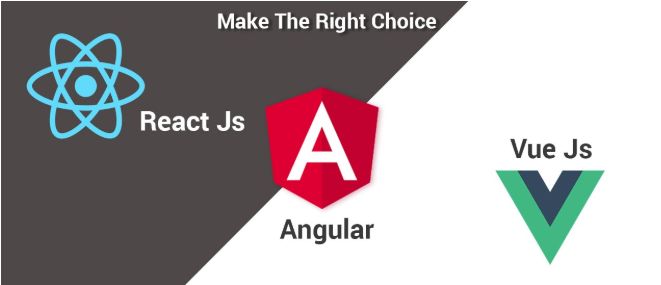Introduction:
Picking a JavaScript framework is like picking the right power tool for your project. There are three big players in the world of web development: React, Angular, and Vue.js. Let’s explore these JavaScript Framework Comparison: React vs Angular vs Vue.js, highlighting their strengths, weaknesses, and ideal use cases for these popular frameworks. Each one has its own unique method of building dynamic, interactive, and engaging web apps.
Understanding React:
- developed by Facebook
- is a JavaScript library known for its component-based architecture.
- uses a virtual DOM for efficient rendering and provides libraries like Redux for state management.
Advantages:
- Modular Simplicity: Component-based architecture simplifies frontend development by breaking into reusable components.
- Efficient Rendering: Utilizing a virtual DOM, ensures faster updates and smoother user experiences.
- Thriving Ecosystem: A big, supportive community offering high quality resources, like Redux for effective state management.
- Streamlined Data Flow: Unidirectional data flow simply state management and debugging for developers.
Disadvantages:
- Learning Curve: Beginners may find React’s flexibility and JSX syntax challenging initially.
- State Management Complexity: Large-scale projects may require additional tools for organized state management.
- Continuous Learning: Keeping up with frequent updates demands ongoing learning and adaptation.
- Flexibility Challenges: Lack of strict conventions can lead to inconsistent code organization.
Understanding Angular:
- developed and maintained by Google
- is a comprehensive JavaScript framework that offers built-in features for tasks like HTTP requests, form handling, routing, etc.
- utilizes two-way data binding and dependency injection.
Advantages:
- Built-in Features: Equipped with tools for common tasks like HTTP requests, form handling, and routing.
- Seamless Data Binding: Angular’s two-way data binding synchronizes model and view, simplifying data management.
- Dependency Injection: Dependency injection improves modularity.
- Efficient Project Setup: Angular CLI makes the project setup easy.
Disadvantages:
- Learning Curve: Angular’s extensive feature set and TypeScript adoption may become challenges for newcomers.
- Heavyweight Framework: Smaller projects may experience performance issues due to Angular’s substantial framework issue.
- Version Upgrade Complexity: Transitioning between major Angular versions can be difficult and time-consuming.
- Strict Conventions: Angular’s agreement to strict conventions may limit flexibility in some scenarios.
Understanding Vue.js:
- created by Evan You
- is a progressive JavaScript framework known for its simplicity and flexibility.
- offers reactive data binding and useful libraries like Vuex and Vue Router.
Advantages:
- Flexibility: suitable for projects of all sizes.
- User-Friendly Learning: A gentle learning curve is appealing to beginners and experienced developers alike.
- Seamlessly Updates: Reactive data binding updates the frontend seamlessly in response to data changes.
- Versatile Ecosystem: Vue.js offers useful libraries like Vuex for state management and Vue Router for routing.
Disadvantages:
- Smaller Community: Vue.js has a growing but smaller community when compared to React and Angular frameworks
- Feature Limitations: Some advanced features are missing in Vue.js, as it is still in the growing phase.
- Potential Performance: Developers may face challenges in applications with complex data structures.
- Flexibility: Some times flexibility may lead to varied code organization, impacting consistency.
The Final Verdict on JavaScript Framework Comparison: React vs Angular vs Vue.js
Choosing the ideal framework depends on the unique symphony of your project’s needs. Consider the following:
- For rapid prototyping and dynamic interfaces: React shines with its flexibility and performance optimization, making it ideal for iterating quickly on design ideas and delivering smooth user experiences.
- For large-scale, complex applications with intricate data flows and business logic: Angular takes the lead with its structured approach, built-in features, and scalability, ensuring efficient code management and maintainability in enterprise-level projects.
- For smaller projects, beginners, or those requiring a gentle learning curve: Vue.js provides a smooth entry point with its adaptability and ease of use, making it well-suited for learning the ropes of web development or tackling smaller projects without a steep learning curve.
Beyond the JavaScript Framework Comparison:
While the framework plays a crucial role, remember these key considerations:
- Team Expertise: Choose a framework that aligns with your team’s existing skillset and learning curve to avoid introducing unnecessary hurdles.
- Project Growth: Consider how the project might scale in the future and choose a framework that can accommodate growth and evolving needs.
- Available Resources: Having access to a large community, extensive documentation, and readily available libraries can significantly ease development and troubleshooting.
Remember:
- Prioritize User Experience (UX): Focus on delivering exceptional user experiences, tailored to your target audience, by considering factors like intuitiveness, responsiveness, and accessibility.
- Maintain Efficient Code: Strive for clean and maintainable code to ensure long-term manageability and scalability for future growth and changes.
- Suitable Framework: Use the suitable framework to optimize development time, performance, and user experience.

Conclusion on the JavaScript Framework Comparison:
Choosing the right JavaScript framework between React, Angular, and Vue.js depends on project specifics and development team preferences. Whether you prioritize flexibility, comprehensive features, or simplicity, there’s a framework tailored to meet your needs.
Stay tuned every Tuesday for fresh insights into frontend topics, because keeping up with the latest in web development has never been more exciting!


